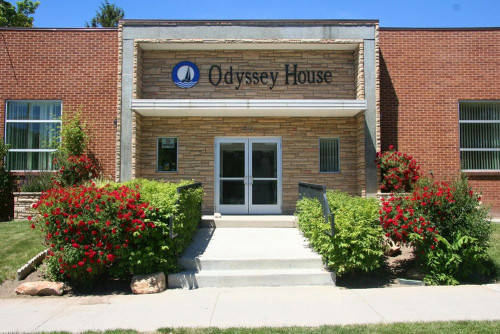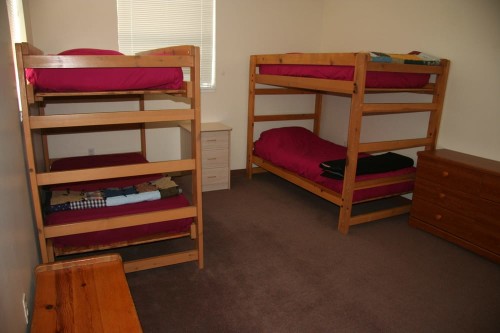



Odyssey House - Teen Residential
Treatment Focus
This center treats substance use disorders and co-occurring mental health conditions. Your treatment plan addresses each condition at once with personalized, compassionate care for comprehensive healing.
Primary Level of Care
Offering intensive care with 24/7 monitoring, residential treatment is typically 30 days and can cover multiple levels of care. Length can range from 14 to 90 days typically.
This provider hasn't verified their profile's information. Are you the owner of this center? Claim your listing to better manage your presence on Recovery.com.
Treatment Focus
This center treats substance use disorders and co-occurring mental health conditions. Your treatment plan addresses each condition at once with personalized, compassionate care for comprehensive healing.
Primary Level of Care
Offering intensive care with 24/7 monitoring, residential treatment is typically 30 days and can cover multiple levels of care. Length can range from 14 to 90 days typically.
Provider's Policy
We are in-network with most insurance carriers and we have programs to help offset insurance costs.
Odyssey House - Teen Residential
Odyssey House - Teen Residential
About Odyssey House - Teen Residential
Odyssey House of Utah is a non-profit substance abuse program offering specialized care for a wide demographic of individuals and families, treating addiction and co-occurring mental health since 1971. Their teen residential program has been helping youth maintain sobriety and reach their full potential with personalized treatment since 1978.
Teen Residential
Odyssey House of Utah provides comprehensive treatment tailored for adolescents and teens ages 13-18 with addiction and co-occurring mental health or behavioral disorders. Teens and families go through a thorough initial assessment to develop individually tailored treatment plans that fit each individual's unique set of circumstances. Treatment teams consist of certified addiction specialists and counselors, in addition to mental health professionals and psychiatric providers, available to treat clients struggling with substance misuse with co-occurring mental health conditions such as depression, anxiety, mood disorders, antisocial personality disorder, and trauma and related conditions. On average, clients are in treatment at the Odyssey House for 6-9 months, and upon successful completion, receive ongoing support to maintain long-term sobriety and live stable and independent lives.
On-Site Academics
Their teen residential facilities emphasize accountability and building a strong recovery foundation based on evidence-based and best practice treatment models. Known for their success in working with teens who have challenging behaviors and attitudes, their individualized approach combines a variety of treatment services, with evidence-based 1-on-1, group, and family therapy, in addition to recreation activities and creative expression through yoga, dance, art, and more.
Odyssey Academy is a core component of their youth residential services, an on-site accredited high school managed by the Salt Lake City School District. Specialized teachers work with students, providing individually tailored assignments designed to help students catch up with credits. With intimate class settings, the student-to-teacher ratio is no more than 12:1, allowing teachers to connect teens to topics they find interesting and expose them to potential degrees, careers, and hobbies, motivating students to continue their education.
Life Skills Development
The teen residential programs reinforce healthy routines that include cooking, laundry, maintaining a clean space, keeping a structured schedule, engaging in healthy relationships, and other important life skills. Sober events and other recreation are integrated into treatment to foster connection and relationship building with peers, allowing clients to experience that it’s possible to have fun in recovery. Clients are provided with the opportunity to step into leadership roles within their peer community and develop motivation and self worth. Vocational services offers training to teens, teaching them marketable skills and other basic employment preparedness activities. Clients are offered a continuum of care through their outpatient programs, with access to robust aftercare services and a supportive alumni community.
Inclusive Quality Care
Odyssey House of Utah strives to empower individuals to heal and build better lives as the largest comprehensive addiction program in the state. Their dedication to connect every individual to treatment fostered their ability to provide low-cost, quality services. They are a Joint Commission accredited facility that accepts Medicaid and most major insurance providers.

Center Overview
Treatment Focus
This center treats substance use disorders and co-occurring mental health conditions. Your treatment plan addresses each condition at once with personalized, compassionate care for comprehensive healing.
Joint Commission Accredited
The Joint Commission accreditation is a voluntary, objective process that evaluates and accredits healthcare organizations (like treatment centers) based on performance standards designed to improve quality and safety for patients. To be accredited means the treatment center has been found to meet the Commission's standards for quality and safety in patient care.
Insurance Accepted
Cash Pay Rates
Estimated Cash Pay Rate
Center pricing can vary based on program and length of stay. Contact the center for more information. Recovery.com strives for price transparency so you can make an informed decision.
Levels of Care






Your Care Options
Specializations
Adolescents
Teens receive the treatment they need for mental health disorders and addiction, with the added support of educational and vocational services.
Co-Occurring Disorders
A person with multiple mental health diagnoses, such as addiction and depression, has co-occurring disorders also called dual diagnosis.
Drug Addiction
Drug addiction is the excessive and repetitive use of substances, despite harmful consequences to a person's life, health, and relationships.
Who We Treat
Adolescents
Teens receive the treatment they need for mental health disorders and addiction, with the added support of educational and vocational services.
Approaches
Evidence-Based
A combination of scientifically rooted therapies and treatments make up evidence-based care, defined by their measured and proven results.
Therapeutic Community
Therapeutic communities allow patients to contribute to the success and progress of their community, through healthy behaviors or even basic chores.
Therapies
1-on-1 Counseling
Patient and therapist meet 1-on-1 to work through difficult emotions and behavioral challenges in a personal, private setting.
Trauma-Specific Therapy
This form of talk therapy addresses any childhood trauma at the root of a patient's current diagnosis.
Rational Emotive Behavior Therapy
A type of cognitive therapy that identifies negative self-defeating thoughts and behaviors, rewriting beliefs to be positive, empowering, and present.
Art Therapy
Visual art invites patients to examine the emotions within their work, focusing on the process of creativity and its gentle therapeutic power.
Dance Therapy
This experiential therapy uses dance to improve body awareness, physical health, and social skills.
Experiential Therapy
With this approach, patients heal by doing. Therapists help patients process difficult emotions to speak, using guided activities like art or dance.
Expressive Arts
Creative processes like art, writing, or dance use inner creative desires to help boost confidence, emotional growth, and initiate change.
Eye Movement Therapy (EMDR)
Lateral, guided eye movements help reduce the emotional reactions of retelling and reprocessing trauma, allowing intense feelings to dissipate.
Conditions We Treat
Anxiety
Anxiety is a common mental health condition that can include excessive worry, panic attacks, physical tension, and increased blood pressure.
Depression
Symptoms of depression may include fatigue, a sense of numbness, and loss of interest in activities. This condition can range from mild to severe.
Post Traumatic Stress Disorder
PTSD is a long-term mental health issue caused by a disturbing event or events. Symptoms include anxiety, dissociation, flashbacks, and intrusive thoughts.
Trauma
Some traumatic events are so disturbing that they cause long-term mental health problems. Those ongoing issues can also be referred to as "trauma."
Substances We Treat
Alcohol
Using alcohol as a coping mechanism, or drinking excessively throughout the week, signals an alcohol use disorder.
Benzodiazepines
Benzodiazepines are prescribed to treat anxiety and sleep issues. They are highly habit forming, and their abuse can cause mood changes and poor judgement.
Co-Occurring Disorders
A person with multiple mental health diagnoses, such as addiction and depression, has co-occurring disorders also called dual diagnosis.
Cocaine
Cocaine is a stimulant with euphoric effects. Agitation, muscle ticks, psychosis, and heart issues are common symptoms of cocaine abuse.
Drug Addiction
Drug addiction is the excessive and repetitive use of substances, despite harmful consequences to a person's life, health, and relationships.
Heroin
Heroin is a highly addictive and illegal opioid. It can cause insomnia, collapsed veins, heart issues, and additional mental health issues.
Psychedelics
Hallucinogenic drugs—like LSD—cause euphoria and increased sensory experiences. When abused, they can lead to depression and psychosis.
Methamphetamine
Methamphetamine, or meth, increases energy, agitation, and paranoia. Long-term use can result in severe physical and mental health issues.
Opioids
Opioids produce pain-relief and euphoria, which can lead to addiction. This class of drugs includes prescribed medication and the illegal drug heroin.
Languages
Aftercare
Care Designed for Your Needs
Personal Amenities
Amenities
Activities
Yoga
Yoga is both a physical and spiritual practice. It includes a flow of movement, breathing techniques, and meditation.





